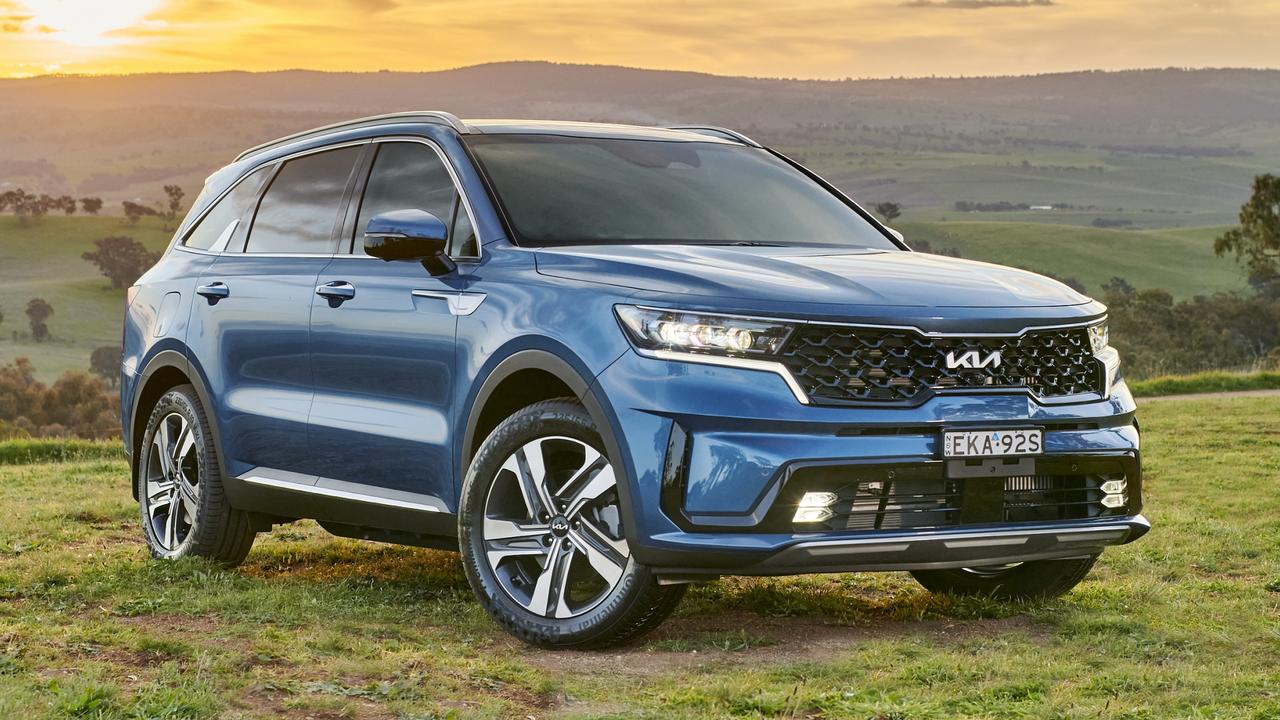Kia’s bold new SUV lands in Australia
Kia has launched its brand new seven-seat SUV that is laden with hi-tech features, but one element is sure to turn off some potential buyers.
Plug-In Hybrids (PHEVs) tend to get a bad rap in road tests. They’re expensive compared with petrol and diesel alternatives, their electric range is often too short for daily driving and most of the time they are running as a conventional hybrid, on petrol and electricity – technology that’s been around for more than 20 years now and which also costs a lot less.
Kia’s new Sorento PHEV GT Line is a typical example. It’s not a bad thing as far as seven-seater SUVs go, but I can’t make a credible case for actually buying it.
Let’s start with the price. Kia is asking (cue sharp intake of breath …) $81,990 drive away. I know it ain’t cheap being green, but this is a whopping $14,700 more than the 2.2-litre diesel Sorento GT Line, and $17,700 more than the 3.5-litre V6 petrol variant.
The sales pitch is that Sorento’s claimed electric-only (EV) range of 68km is sufficient for many people’s day to day driving, which is certainly true.
However, the range numbers claimed by car makers for their EVs and hybrids are just as rubbery as the ones they publish for their petrol and diesel-powered vehicles. In the real world, they are inevitably optimistic and rarely achievable.
Kia’s 68km claim for the Sorento is based on the NEDC standard, still used in Australia but now superseded by the more realistic WLTP test protocol in Europe. Sorento’s WLTP range is 56km.
Sorento has switchable EV and Hybrid (HEV) modes, or you can just let its software make the decision. A six-speed automatic and all-wheel drive are standard.
Driving around town, our test car covered 25km in EV mode.
Then, with the infotainment screen display showing 61 per cent charge in the 13.8kWh battery, and a remaining range of 27 km, the 1.6-litre turbo petrol engine began to fire up
intermittently.
In slow moving traffic, you should get 50-60km on the battery alone, but Sorento’s software will override EV mode and start the engine under some circumstances – if you use more than 70 per cent of accelerator travel, for example, once you reach open road speeds. It will also fire up to keep the 12-volt battery (which runs the aircon, lights and other ancillaries) fully charged.
When an internal combustion engine is running, even though it isn’t spinning the wheels, you’re not really driving a clean, green EV at all. You are burning fossil fuel and making Greta Thunberg angry.
Still, with the petrol engine making only an occasional contribution, instead of having to haul two tonnes of luxury SUV around, fuel consumption in town was just 2.7L/100km.
The 3.5-litre V6 petrol Sorento averages 13.8L/100km.
Kia’s WLTP fuel consumption average for Sorento PHEV is 1.6L/100km.
Running in hybrid (HEV mode) on the highway, with the petrol engine and electric motor operating together in parallel, Sorento PHEV averaged 7.2L/100km. When I tested the Sorento diesel last year, on the same road, it averaged 7.0L/100km.
Sorento’s battery needs to be recharged from a power source.
This takes four to six hours from a household power point, using the supplied cable, or three and a half hours from an optional ($2829.59) 3.3kW wall-mounted charger.
Sorento’s cost/benefit ratio may be questionable, but as a drive it’s an exceptionally refined, luxurious SUV.
You get immediate, responsive EV torque, respectable performance (0-100km/h in 8.4 seconds) and seamless, smooth hybrid operation, albeit with occasional hesitancy from the auto.
Sorento is one of the tidier handling big SUVs, and while there’s plenty of body roll when cornering, the PHEV feels confident and planted at speed, with a supple, quiet and well controlled ride.
GT-Line spec is uber luxe, with quilted Nappa leather-faced upholstery, heated/ventilated front seats, heated row-two seats, Bose sound, three-zone air, USBs for all seats, automatic parking, a sunroof and comprehensive driver assist safety tech.
You get most of this fruit in Sorento GT-Line petrol and diesel, of course, for a lot less cash.
VERDICT 3/5
PHEV technology looks good on paper, but you pay a massive premium for it and, in the real world, the pay-off doesn’t quite match the promises.
KIA SORENTO PHEV VITALS
Price: $81,990 drive away
Engine/motors: 1.6-litre 4-cyl turbo plug-in hybrid, 195kW/350Nm
Warranty/servicing: 7-year/unlimited km, $4903 for 7 years
Safety: Seven airbags, auto emergency braking, adaptive cruise, blind-spot monitoring, lane-keep assist, rear cross-traffic alert
Fuel: 1.6L/100km
Cargo: 604 litres (5-seater mode)
Spare: Full size
For all the latest Technology News Click Here

